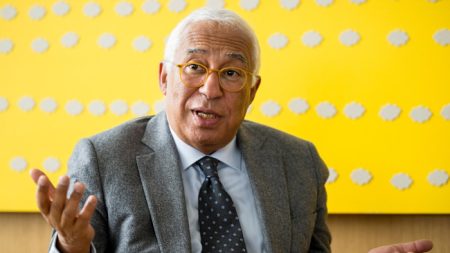Unlock the Editor’s Digest for free
Roula Khalaf, Editor of the FT, selects her favourite stories in this weekly newsletter.
Shares in the company behind WeightWatchers fell sharply on Friday after it downgraded its sales outlook and announced a major restructuring to fend off the challenge from a new generation of anti-obesity drugs.
WW International said on Thursday it was launching a “significant streamlining” of the business to combat a “rapidly changing landscape”, as it reported a 4 per cent drop in quarterly profits and an 11 per cent decline in sales.
The New York-listed company’s stock price fell 17 per cent in pre-market trading, and a further 6 per cent in early trading on Friday, taking its share price down by more than 90 per cent over the past 12 months and giving it a market capitalisation of about $70mn.
Its new cost-cutting drive comes after the company, which was founded in 1963, began dispensing anti-obesity drugs known as GLP-1 agonists last year, transitioning from a direct-to-consumer food company to a hybrid digital health business. It now administers medications including Eli Lilly’s Zepbound and Novo Nordisk’s Wegovy.
“In order to win in this dynamic GLP-1 environment, we are completely reimagining how we operate to catalyse our path as the leading digital weight health provider,” said chief executive Sima Sistani, speaking to analysts following the update on Thursday.
The group plans to save $100mn annually via its restructuring, which includes cutting 40 per cent of its senior executive positions. It said the overhaul would cost between $12mn and $15mn in the second half of its current financial year.
The company began dispensing GLP-1s last year through the acquisition of tele-health company Sequence, which enabled it to prescribe the drugs to its customers through a new arm of the company called WeightWatchers Clinic. The unit combines a behavioural change programme with medication.
But a shortage of the drugs, a proliferation of compounded GLP-1s — alternative versions of the jabs — and growing competition from other health businesses has challenged that new strategy.
Sistani said its number of competitors had increased by 50 per cent since 2023 and that many of them offered the compounded drugs. WeightWatchers had always said it would not offer alternatives to its customers, but when asked on the call if this had changed, Sistani did not rule it out.
“[US Food and Drug Administration] approved medications are our preferred path,” she said. “That being said, with shortages expected to persist for some time and coverage being in limbo, we are investigating alternative paths to best serve our members.”
The US company’s second-quarter revenues, at $202mn, were lower than expected. And the group cut its full-year sales target from a range of between $830mn and $860mn, to “at least” $770mn.
Profits were better than expected in the second quarter, however, with adjusted earnings standing at $38mn compared with analyst estimates of $33mn.
Barclays analysts said that while the restructuring was probably beneficial in the long term, “this pivot does not come without meaningful execution risk, especially when done amid a difficult macro backdrop”.
Read the full article here














